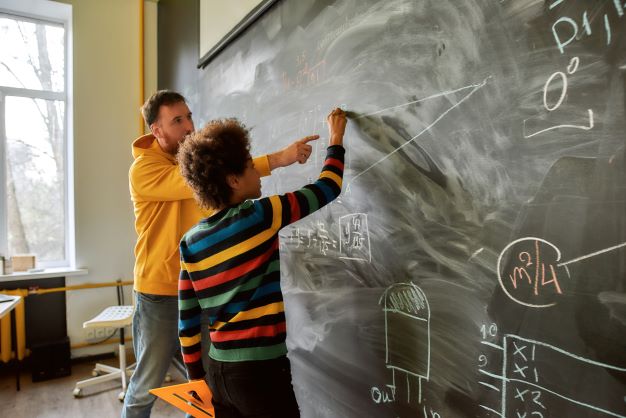
Every parent wants to do their best to set their child on the path to success. It can feel overwhelming when your child is diagnosed with a learning disability.
You may wonder how to help them overcome their challenges. Or maybe you feel unequipped to support them. Your emotions may be overpowering, but there are ways that you can help your child succeed. It just might look a little different than you expected.
About 15 per cent of school children have a learning disability, according to the National Center for Education Statistics (NCES). Of those, 33 percent are diagnosed with a specific learning disability.
NCES statistics show that 76 percent of students with a learning disability were able to complete their education and receive a high school diploma. Another 10 percent gained an alternative certificate.
These statistics are encouraging for parents of children with learning disabilities. Take heart that neurodivergent children can succeed in school. You just have to give them the necessary support.
Let’s look at how you can support your child and guide them down the road to effective learning.
Difference Between Neurodivergence and Learning Disability

The term neurodivergent refers to children with diagnosed learning disabilities. This includes autism and ADHD. However, neurodivergence is based on the idea that there is no one way that the brain is wired. Rather, there are various ways our brains work.
The term was first used in the 1990s, but it is a non-medical one. This movement believes that children who cannot learn well in a traditional classroom setting can succeed with other learning tools.
Part of the neurodivergent movement is acknowledging that these learning difficulties present challenges for children in achieving their goals. Whereas before, the focus was on the symptoms of learning disabilities to help students get where they want to be.
Strategies to Help Kids With a Learning Disability
Helping overcome children’s learning disabilities begins with the right attitude. It’s important to stay focused on reality. Even if a child struggles in the classroom, there are ways and tools to help them learn. Here are some strategies you can use with children that have a learning disability.

Offer Support
Everyone faces obstacles in their lives. What’s more, when you have a neurodivergent child, learning will be a challenge for them. But it’s not impossible. Start by offering your child love and support. Let them know that you believe in them and that they are not worth less than others. Your moral support will teach your child how to overcome challenges in life without giving up or becoming disheartened.
Gain Knowledge
Become an expert on your child. Find out more about their unique learning disability. It’s easy to want to rely on doctors or specialists for information. But, it will be empowering to you as a parent to seek answers from various sources so long as they are reliable. Read studies and reports on learning disabilities. And most of all, study your child to understand what works and what doesn’t.
Know the Law
Understand the rules that govern your child’s education. If your child has been officially diagnosed with a learning disorder, your school must create an individualized learning plan or ILP. However, an ILP may not include all the tools your child needs to succeed. And some schools may have extra accommodations they can provide, but you’ll need to ask for them.

Advocate
Part of gaining knowledge is to use it. You may have to speak up time and time again for your child so that their needs are understood and addressed. This can feel exhausting, but it is a vital tool to help your child succeed. Don’t let your frustration get the better of you. Always strive to be calm and respectful. This will demonstrate to your child how they can stand up for themselves too.
Research Learning Styles
Each of us learns differently. Some are kinesthetic learners and need to move and use their senses in the learning process. Others benefit from more auditory methods, such as listening or classroom discussions. Some visual learners benefit more from seeing instruction, such as videos or demonstrations.
It will be beneficial if you combine what you know about your neurodivergent child’s challenges with the different learning styles. Then, you can create an atmosphere more suited to helping them succeed. For example, placing your child in classroom lectures will be frustrating for your child, you, and the instructors if your child is a visual learner.

Add Tools
You’ll likely need to add extracurricular tools to help your child learn. Schools can only offer so much. Depending on your child’s needs, you may want to consider a special ed tutor. They can help your child with their most difficult subjects. In fact, one-on-one sessions with a tutor who understands the needs of your child’s neurodivergence can make all the difference.
Think Beyond School
Your main focus right now may be on how to help your child succeed in school. However, it’s essential to think beyond their schooling years. Good report cards are important. But, your child must have a healthy sense of self, determination, grit, and communication skills. Plus, they need the ability to develop good relationships to succeed in life.
Tutoring the Neurodivergent Child

Students with learning disabilities have unique ways of looking at the world. Educators and parents should encourage their creative natures. Even if they learn the best outside the classroom, they can succeed.
Tutoring sessions with School is Easy can uncover the best way for your child to learn. Equipped with this knowledge, your family will be better able to make the adjustments needed for success.
As the parent of a neurodivergent child, you’re often short on time. With our special ed tutoring, you can be confident that your child will get the attention they need. Our tutors understand various learning challenges and the best practices for success. We also know that as the parent of a child with learning disabilities, you can’t do it all. Let us come alongside you and your child to help.
At School is Easy, we believe that with the right attention, every child can become their own hero! Contact us to book a tutor today.





